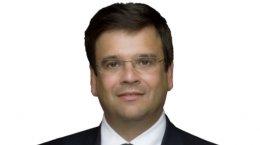Robert Swannell is heading back to his desk with a bottle of mouthwash. The chairman of Britain’s best-known retailer, Marks and Spencer, gives a sheepish smile, as though caught sneaking a sip from a half-empty whisky decanter.
But the detail is telling: with more than 30 years as a banker advising chief executives and chairmen, and latterly as a director and chairman himself, Mr Swannell has built a career and a network on the virtues of discretion, levelheadedness and sweet-talking – and, in part, by shunning management responsibility.
Once settled in his 10th-floor office – decorated with lithographs by his ex-banker wife – Mr Swannell explains how he told Schroders in 1997 that he “wanted no further part in managing the investment bank. I simply wanted to look after clients and be ... a ‘trusted adviser’ to a number of large, interesting companies.â€
If “large†and “interesting†are the criteria for igniting Mr Swannell’s interest, M&S should be the perfect fit. He had previously chaired only one listed company – HMV, the smaller book and music retail group – so his appointment to a FTSE 100 chairmanship surprised investors when news leaked in summer 2010. When he told his mother, she responded, after a pause: “I think that’s quite good.â€
The rest of Britain seems in a constant fever about “Marks and Sparksâ€. If its designs are too racy, it is accused of deserting core customers; if too dowdy, it is said to be open to attack from rivals. Having announced its worst trading in clothing in three years in July, reshuffled management and suffered rumours about a takeover by private equity, the group is on its mettle to show improvement in next week’s half-year results.
The company’s position in the British shopping and shareholding psyche is not the only reason the focus is on Mr Swannell and Marc Bolland, chief executive. They took up their roles after a turbulent period when Sir Stuart Rose as chief executive also held the chairmanship, contravening UK governance orthodoxy.
Mr Swannell knows Sir Stuart well. While at Citigroup (which took over Schroders’ investment banking business in 2000), he advised him in several bid situations, including M&S’s defence against an unsolicited approach from the entrepreneur Sir Philip Green in 2004. But he describes his relationship with his predecessor as a “business friendship†and says that in his current role he does not, has not and would not talk to him about M&S.
It is one of many aspects of M&S’s recent past Mr Swannell is reluctant to discuss. But it is clear in almost everything he says – in an urbane, earnest tone, reminiscent of Prince Charles – that his personal style is quite different from that of his outspoken, high-profile predecessor, and that he has set out to manage the board in a way that defies the popular caricature of the way it used to be run.
“There is nothing worse, in my view, than a board where the chairman ... has all the answers and the rest of the board sits around saying ‘what’s my role?’,†he says, pointing out that humility and lack of ego are vital qualities for the job.
Was that the kind of boardroom Mr Swannell inherited? The former banker’s veil of discretion descends again. “It won’t surprise you that I’m not going to go there,†says Mr Swannell.
The roles of chairman and chief executive should be separate, he adds, because they are different. “I think a chairman should not be taking the role to make his name ... If, at the end of my time at M&S, I remained relatively unknown, I genuinely would think that I’d probably done my job pretty well.â€
Whether he maintains near anonymity at the top of a business in the public eye will depend on how well he manages relations with his chief executive, investors and board. Mr Swannell says he and Mr Bolland have mapped out distinct responsibilities – “he’s running the company; I’m running the board†– and agreed the board should focus on corporate culture, strategy and succession. “If you look at what [succession planning] costs a company when it goes wrong, it’s fundamental,†says Mr Swannell.
Meanwhile, his efforts to encourage communication with investors seem to be paying off. In 2009 the Local Authority Pension Fund Forum, which acts for 55 UK public-sector funds, called for an independent chairman to replace Sir Stuart. It has given his successor the keynote speech at its annual conference next month.
In the boardroom, Mr Swannell is trying to foster an atmosphere of openness and challenge, ensuring directors focus on the right agenda and information, and using new appointments to match their skills to the strategy – by adding international experience, for instance. “He takes feedback remarkably well and asks for feedback a lot,†says Martha Lane Fox, the entrepreneur who has been an M&S director since 2007.
Successful boards, Mr Swannell says, “have prepared properly and have understood what they are about, have got a shared sense of purpose, and are able to cope when difficult things happen, as they willâ€. Among those “difficult things†is a possible bid. He says he is not fixated on the threat, but on trying to ensure, through engagement and strategic success, that investors keep faith.
M&S “is quite unlike many other companies ... it is something that people feel they have ownership ofâ€, he admits. He still keeps four £1 notes in his wallet to remind him of the 400p-a-share bid approach he helped M&S fight eight years ago; the shares currently trade at about 388p.
Has he thought through a scenario like the one confronting Cadbury in 2010, when the UK confectioner’s board recommended a bid from Kraft of the US, despite the patriotic lamentations of public and politicians? “I may have done but ... it’s so hypothetical I’m not going to answer.â€
Does it matter who owns M&S?
“It might do.â€
But would it not be rather different handling a bid as the steward of the company rather than as an adviser? “Absolutely,†he says. “And I’m perfectly happy to be that. If you ask the question: ‘Are you prepared for that responsibility?’ Yes, I am. And am I prepared to think through the issues when they arrive? Absolutely, yes I am. And do I think I’m pretty well-equipped to do that? Yes, I do. And do I think that I’ve seen as many different variations on [that] theme as most people? Again, yes I have.â€
The ripple that briefly disturbed the orderly calm Mr Swannell claims he has brought to M&S passes, but the reaction confirms there is a steeliness behind his effortless charm. He claims he never set his sights on heading the board of a public company: “I could easily have gone a different route and said I didn’t want to chair something. But, when I thought about it, I felt I wouldn’t have tested myself if I hadn’t.â€
Mr Swannell’s biggest tests, however, are almost certainly still to come.
More News From Financial Times





